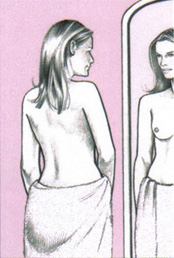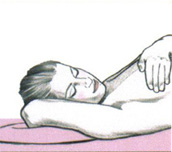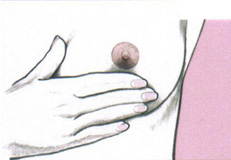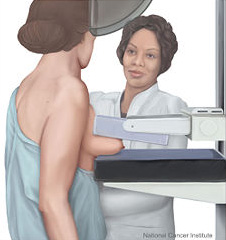عربي Welcome To Sphinx Cure Oncology Center
Being committed to the duty of Cancer prevention, The Center offers a number of selected educational video
materials to aid the concerned to understand more about Oncology.
Education can help ease the anxiety of the unknown.
It can help debunk the many myths people are told by
well-meaning friends and family.
Moreover, we feel strongly that an educated patient is better able to advocate for themselves.
They are
better prepared to care for themselves at home, manage side effects, and safely go through treatment.
 Raise one arm, with fingers flat touch every part of each breast, gently feeling for a lump or
thickening, use your right hand to examine your left breast & vice versa.
Raise one arm, with fingers flat touch every part of each breast, gently feeling for a lump or
thickening, use your right hand to examine your left breast & vice versa.
 Stat with your arms at your sides, then raise them above your head, carefully looking for changes in
size, shape & contour of each breast. Look for puckering, dimpling or changes in skin texture.
Stat with your arms at your sides, then raise them above your head, carefully looking for changes in
size, shape & contour of each breast. Look for puckering, dimpling or changes in skin texture.
Gently squeeze both nipples & look for a discharge.

 Place a towel or pillow under your right shoulder & your right hand behind your head.
Place a towel or pillow under your right shoulder & your right hand behind your head.
Examine your right breast with your left hand.
With fingers flat, press gently in small circles, starting at the outermost top edge of your breast &
spiralling in toward the nipple.
.
Examine every part of the breast. Repeat with left breast.
With your arm resting on a firm surface, use the same circular motion to examine the under arm area,
this is breast tissue too.
A mammogram is an x-ray picture of the breast.
Early detection of breast cancer with screening mammography means that treatment can be started earlier in the course of the disease, possibly before it has spread.
 Mammograms require very small doses of radiation. The risk of harm from this radiation exposure is low,
but repeated x-rays have the potential to cause cancer.
The benefits, however, nearly always outweigh the risk.
Mammograms require very small doses of radiation. The risk of harm from this radiation exposure is low,
but repeated x-rays have the potential to cause cancer.
The benefits, however, nearly always outweigh the risk.
Getting a high-quality screening mammogram and having a on a regular basis are the most effective ways
to detect breast cancer early.
As with any screening test, screening mammograms have both benefits and limitations. For example, some
cancers cannot be detected by a screening mammogram but may be found by a clinical breast exam.